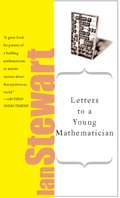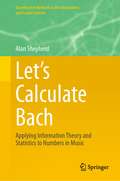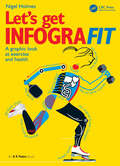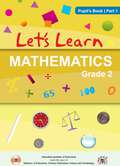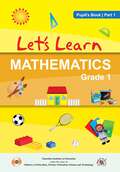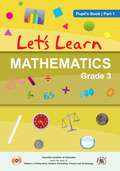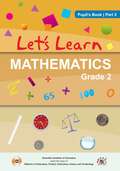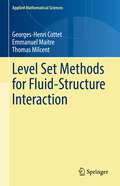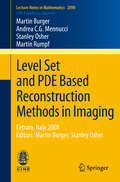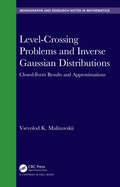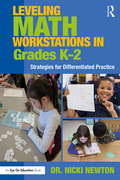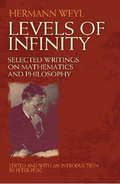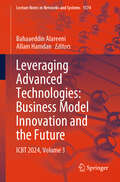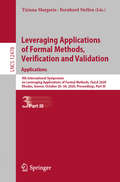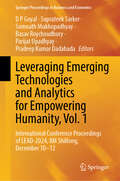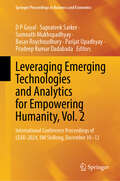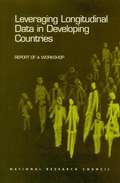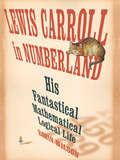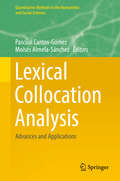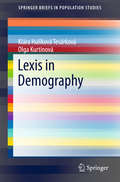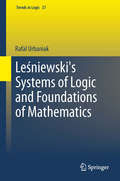- Table View
- List View
Letters to a Young Mathematician
by Ian StewartThe first scientific entry in the acclaimed Art of Mentoring series from Basic Books,Letters to a Young Mathematiciantells readers what Ian Stewart wishes he had known when he was a student and young faculty member. Subjects ranging from the philosophical to the practical--what mathematics is and why it's worth doing, the relationship between logic and proof, the role of beauty in mathematical thinking, the future of mathematics, how to deal with the peculiarities of the mathematical community, and many others--are dealt with in Stewart's much-admired style, which combines subtle, easygoing humor with a talent for cutting to the heart of the matter. In the tradition of G. H. Hardy's classicA Mathematician's Apology, this book is sure to be a perennial favorite with students at all levels, as well as with other readers who are curious about the frequently incomprehensible world of mathematics.
Let’s Calculate Bach: Applying Information Theory and Statistics to Numbers in Music (Quantitative Methods in the Humanities and Social Sciences)
by Alan ShepherdThis book shows how information theory, probability, statistics, mathematics and personal computers can be applied to the exploration of numbers and proportions in music. It brings the methods of scientific and quantitative thinking to questions like: What are the ways of encoding a message in music and how can we be sure of the correct decoding? How do claims of names hidden in the notes of a score stand up to scientific analysis? How many ways are there of obtaining proportions and are they due to chance?After thoroughly exploring the ways of encoding information in music, the ambiguities of numerical alphabets and the words to be found “hidden” in a score, the book presents a novel way of exploring the proportions in a composition with a purpose-built computer program and gives example results from the application of the techniques. These include information theory, combinatorics, probability, hypothesis testing, Monte Carlo simulation and Bayesian networks, presented in an easily understandable form including their development from ancient history through the life and times of J. S. Bach, making connections between science, philosophy, art, architecture, particle physics, calculating machines and artificial intelligence. For the practitioner the book points out the pitfalls of various psychological fallacies and biases and includes succinct points of guidance for anyone involved in this type of research.This book will be useful to anyone who intends to use a scientific approach to the humanities, particularly music, and will appeal to anyone who is interested in the intersection between the arts and science.With a foreword by Ruth Tatlow (Uppsala University), award winning author of Bach’s Numbers: Compositional Proportion and Significance and Bach and the Riddle of the Number Alphabet.“With this study Alan Shepherd opens a much-needed examination of the wide range of mathematical claims that have been made about J. S. Bach's music, offering both tools and methodological cautions with the potential to help clarify old problems.” Daniel R. Melamed, Professor of Music in Musicology, Indiana University
Let’s Get Infografit: A Graphic Look at Exercise and Health (AK Peters Visualization Series)
by Nigel HolmesWhat do belly dancing, pickleball, mountain biking, metabolism, the food pyramid, yoga, the Greek Olympiad, Charles Atlas, broccoli, and tongue twisters have in common? Answer: they are all explained in Let’s Get Infografit, drawn in graphic detail.The book has a quick and easy exercise program, but it’s also a how-to-show-it graphics manual, with examples from Greek vases through 19th and 20th century exercise plans, as well diagrams that explain how to prepare for sports, and to repair any damage while participating in them. It deals with many aspects of exercise: why it’s good for you; what happens if you don’t move around enough; medical and anatomical explanations of soreness and exhaustion; the exhilaration of doing physical activity. It also includes a chapter on nutrition.What’s a dumbbell? Or a Burpee? Or a medicine ball? What makes you “hit the wall?” Do you really need to take 10,000 steps a day? (Hint: NO!) Why do golf balls have dimples? Driven by explanatory graphics both historic and contemporary, Let’s Get Infografit is about exercise and fitness for people who already love it, and also for people who know they should—but don’t! If you can smile while getting healthy at the same time you may learn to love it too.
Let’s Learn Mathematics Part-1 - Pupil's Book class 2 - MIE
by Mauritius Institute of EducationThe Grade 2 Mathematics Workbook and Teacher’s Book align with the philosophical principles of the New Curriculum Framework (Primary) and extend the pedagogical approaches from Grade 1. Designed to facilitate a smooth transition, the materials aim to enhance pupils' understanding and enjoyment of key mathematical concepts. Concepts are introduced sequentially through engaging stories, connecting them to real-life contexts, with an emphasis on interdisciplinary links, life skills, and ICT integration. Child-friendly presentation and progressive activities aid comprehension, while continuous assessment and profiling support educators in monitoring pupil progress. The role of educators as facilitators is underscored, encouraging them to leverage the 'Note to Teacher' for effective conceptual understanding. The Mathematics Panel anticipates that these curriculum materials will instill enjoyment and foster a deeper interest in the study of Mathematics among pupils.
Let’s Learn Mathematics Part-1 - Pupil’s Book class 1 - MIE
by Mauritius Institute of EducationThe Mathematics Pupil’s Book Part 1 for Grade 1 offers a comprehensive foundation for young learners in fundamental mathematical concepts aligned with the National Curriculum Framework. Structured around three engaging themes - Home, School, and Games - the textbook incorporates a variety of activities, such as drawing, tracing, writing, coloring, matching, sorting, and comparing objects and numbers. These activities are designed to be interactive and enjoyable, fostering a child-friendly learning environment. Clear learning objectives and outcomes are outlined for each theme and unit, accompanied by continuous assessment and profiling exercises to gauge student progress. The textbook also features an annex with a memory game to reinforce recognition of shapes, colors, and numbers. Overall, it provides a well-rounded and interactive approach to cultivating essential mathematical skills in Grade 1 students.
Let’s Learn Mathematics Part-1 - Pupil’s Book class 3 - MIE
by Mauritius Institute of EducationThe Grade 3 Mathematics Pupil’s Book Part 1 offers a comprehensive exploration of key mathematical concepts essential for third-grade students. It covers Geometry, introducing shapes, sides, vertices, patterns, tessellation, and activities integrating ICT tools like Ms Paint. Additionally, it delves into Graphs, teaching how to understand and create pictograms, count shapes, and interpret data using ICT tools. The book also focuses on Numbers, from 0 to 1000, emphasizing place value, number sequences, and exercises involving the abacus and number lines. Furthermore, it addresses Addition techniques, including adding numbers with and without carrying, solving word problems, and utilizing ICT for practice. Mass concepts, such as comparing weights and practical activities to grasp kilograms, are also covered. Emphasizing technology in learning, the book incorporates continuous assessment and profiling sections to monitor student progress effectively.
Let’s Learn Mathematics Part-2 - Pupil's Book class 2 - MIE
by Mauritius Institute of EducationThe Mathematics Grade 6 Pupil’s Book Part 2, designed for students in Mauritius, is a comprehensive textbook developed by the Mauritius Institute of Education and the Ministry of Education and Human Resources. The textbook comprises of units covering diverse mathematical topics like patterns, sequences, powers, time, area, percentages, averages, ratio, proportion, angles, charts, coordinates, line graphs, volume, speed, and problem-solving. Each unit begins with clear learning objectives and concludes with activities to assess students' understanding and skills. The content is reinforced with examples, diagrams, tables, and pictograms to illustrate concepts and methods. Additionally, appendices at the end provide valuable templates for creating 3-D cubes and cuboids, along with examples of shapes and their names. This well-structured textbook aims to enhance students' mathematical proficiency through engaging content and practical exercises.
Let’s Learn Mathematics Part-2 - Pupil’s Book class 1 - MIE
by Mauritius Institute of EducationThe Mathematics Pupil’s Book Part 2 for Grade 1 is a comprehensive resource designed to cultivate fundamental mathematical concepts and skills in young learners. Covering areas such as numbers, shapes, addition, ordinal numbers, length, mass, time, and money, the textbook engages students with thematic units like "Food," "Transport," and "Animals." Each unit creatively integrates mathematical principles with real-world examples, such as fruits and vegetables, vehicles, and animals, making the learning experience relatable and enjoyable. In addition to these thematic units, the textbook provides valuable sections including Learning Objectives, Acknowledgements, Table of Contents, Profiling, and IT Pack, offering insights into the textbook's aims, authors, structure, assessment, and online resources. This holistic approach ensures a well-rounded learning experience, fostering the development of essential mathematical skills in Grade 1 students.
Let’s Learn Mathematics Part-2 - Pupil’s Book class 3 - MIE
by Mauritius Institute of EducationThe Grade 3 Mathematics Pupil’s Book Part 2 delves into fundamental concepts such as capacity, ordinal numbers, Roman numerals, multiplication, and more. Designed to enhance arithmetic skills and mental calculations, it also focuses on fractions and measurement. Through engaging activities, students explore concepts like measuring length, solving word problems, and grasping the significance of units. With clear learning objectives centered around arithmetic operations and practical application, this book aims to foster a comprehensive understanding of mathematical concepts essential for the Grade 3 curriculum.
Level Set Methods for Fluid-Structure Interaction (Applied Mathematical Sciences #210)
by Georges-Henri Cottet Emmanuel Maitre Thomas MilcentThis monograph is devoted to Eulerian models for fluid-structure interaction by applying the original point of view of level set methods.In the last 15 years, Eulerian models have become popular tools for studying fluid-structure interaction problems. One major advantage compared to more conventional methods such as ALE methods is that they allow the use of a single grid and a single discretization method for the different media. Level set methods in addition provide a general framework to follow the fluid-solid interfaces, to represent the elastic stresses of solids, and to model the contact forces between solids.This book offers a combination of mathematical modeling, aspects of numerical analysis, elementary codes and numerical illustrations, providing the reader with insights into the applications and performance of these models.Assuming background at the level of a Master’s degree, Level Set Methods for Fluid-Structure Interaction provides researchers in the fields of numerical analysis of PDEs, theoretical and computational mechanics with a basic reference on the topic. Its pedagogical style and organization make it particularly suitable for graduate students and young researchers.
Level Set and PDE Based Reconstruction Methods in Imaging
by Martin Burger Andrea C. G. Mennucci Stanley Osher Martin RumpfThis book takes readers on a tour through modern methods in image analysis and reconstruction based on level set and PDE techniques, the major focus being on morphological and geometric structures in images. The aspects covered include edge-sharpening image reconstruction and denoising, segmentation and shape analysis in images, and image matching. For each, the lecture notes provide insights into the basic analysis of modern variational and PDE-based techniques, as well as computational aspects and applications.
Level-Crossing Problems and Inverse Gaussian Distributions: Closed-Form Results and Approximations (Chapman & Hall/CRC Monographs and Research Notes in Mathematics)
by Vsevolod K. MalinovskiiLevel-Crossing Problems and Inverse Gaussian Distributions: Closed-Form Results and Approximations focusses on the inverse Gaussian approximation for the distribution of the first level-crossing time in a shifted compound renewal process framework. This approximation, whose name was coined by the author, is a successful competitor of the normal (or Cramér's), diffusion, and Teugels’ approximations, being a breakthrough in its conditions and accuracy. Since such approximations underlie numerous applications in risk theory, queueing theory, reliability theory, and mathematical theory of dams and inventories, this book is of interest not only to professional mathematicians, but also to physicists, engineers, and economists. People from industry with a theoretical background in level-crossing problems, e.g., from the insurance industry, can also benefit from reading this book. Features: Primarily aimed at researchers and postgraduates, but may be of interest to some professionals working in related fields, such as the insurance industry Suitable for advanced courses in Applied Probability and, as a supplementary reading, for basic courses in Applied Probability
Leveling Math Workstations in Grades K–2: Strategies for Differentiated Practice
by Nicki NewtonIn this book from bestselling author Dr. Nicki Newton, you’ll learn how to level math workstations to engage K–2 students in meaningful, purposeful, rigorous practice. We know students don’t learn at the same pace, so how do we take into account where they are and differentiate instruction? Dr. Nicki has the answers, showing how leveled workstations are key in the formative years, how they help students operate in their zone of proximal development and how we can use them to help students progress to higher levels of math achievement. Topics include: Understanding the framework for leveled workstations Making sure workstations are rigorous and not just providing busy work Building your stations in key areas such as counting, numbers, place value, fluency and word problems Keeping students accountable, and knowing where they are in their learning trajectory Each chapter offers specific examples, activities and tools. There is also a clear, step-by-step action plan to help you implement the ideas immediately in your own classroom.
Levels of Infinity: Selected Writings on Mathematics and Philosophy (Dover Books on Mathematics)
by Hermann Weyl Peter PesicThis original anthology collects 10 of Weyl's less-technical writings that address the broader scope and implications of mathematics. Most have been long unavailable or not previously published in book form. Subjects include logic, topology, abstract algebra, relativity theory, and reflections on the work of Weyl's mentor, David Hilbert. 2012 edition.
Leveraging Advanced Technologies: ICBT 2024, Volume 3 (Lecture Notes in Networks and Systems #1574)
by Allam Hamdan Bahaaeddin AlareeniThis book examines how next-generation tools such as artificial intelligence, blockchain, and the Internet of Things are transforming not only the way companies operate, but also how they create value, define strategy, and drive growth. As emerging technologies reshape the business landscape, innovation has become a necessity rather than a choice. It offers an in-depth exploration of the evolving business model innovation landscape, combining diverse methodologies and real-world industry cases to illustrate the powerful intersection of technology and strategic transformation. Through practical insights, evidence-based analysis, and compelling case studies, this book equips decision-makers to adapt, innovate, and lead in a rapidly evolving digital environment. What You&’ll Discover: · The role of AI, blockchain, and IoT in reinventing business models · Frameworks and strategies for leveraging disruptive technologies · Policy and managerial insights to guide innovation in practice &
Leveraging Applications of Formal Methods, Verification and Validation: 9th International Symposium on Leveraging Applications of Formal Methods, ISoLA 2020, Rhodes, Greece, October 20–30, 2020, Proceedings, Part III (Lecture Notes in Computer Science #12478)
by Tiziana Margaria Bernhard SteffenThe three-volume set LNCS 12476 - 12478 constitutes the refereed proceedings of the 9th International Symposium on Leveraging Applications of Formal Methods, ISoLA 2020, which was planned to take place during October 20–30, 2020, on Rhodes, Greece. The event itself was postponed to 2021 due to the COVID-19 pandemic. The papers presented were carefully reviewed and selected for inclusion in the proceedings. Each volume focusses on an individual topic with topical section headings within the volume:Part I, Verification Principles: Modularity and (De-)Composition in Verification; X-by-Construction: Correctness meets Probability; 30 Years of Statistical Model Checking; Verification and Validation of Concurrent and Distributed Systems. Part II, Engineering Principles: Automating Software Re-Engineering; Rigorous Engineering of Collective Adaptive Systems. Part III, Applications: Reliable Smart Contracts: State-of-the-art, Applications, Challenges and Future Directions; Automated Verification of Embedded Control Software; Formal methods for DIStributed COmputing in future RAILway systems.
Leveraging Emerging Technologies and Analytics for Empowering Humanity, Vol. 1: International Conference Proceedings of LEAD-2024, IIM Shillong, December 10–12 (Springer Proceedings in Business and Economics)
by Somnath Mukhopadhyay Suprateek Sarker D P Goyal Basav Roychoudhury Parijat Upadhyay Pradeep Kumar DadabadaThis book provides a platform for interdisciplinary discussions on leveraging emerging technologies and analytics to empower humanity, fostering collaboration between experts in AI and analytics, sustainability, different areas of management, and IT. As the world grapples with complex challenges, from climate change to economic inequality, this first volume of a two-volume proceedings series is a crucial resource for fostering collaboration and exploring untapped potential of emerging technologies. By harnessing the power of AI, blockchain, IoT, and big data, the chapters address critical global challenges towards improving quality of life and promoting inclusive and sustainable development, while keeping in mind ethical implications, and their impact on social justice. The volume will be of use to thought leaders, researchers, innovators, and policymakers from around the globe who are interested in knowing more on how cutting-edge technologies can be harnessed for the greater good of society.
Leveraging Emerging Technologies and Analytics for Empowering Humanity, Vol. 2: International Conference Proceedings of LEAD-2024, IIM Shillong, December 10–12 (Springer Proceedings in Business and Economics)
by Somnath Mukhopadhyay Suprateek Sarker D P Goyal Basav Roychoudhury Parijat Upadhyay Pradeep Kumar DadabadaThis book provides a platform for interdisciplinary discussions on leveraging emerging technologies and analytics to empower humanity, fostering collaboration between experts in AI and analytics, sustainability, different areas of management, and IT. As the world grapples with complex challenges, from climate change to economic inequality, this second volume of a two-volume proceedings series is a crucial resource for fostering collaboration and exploring untapped potential of emerging technologies. By harnessing the power of AI, blockchain, IoT, and big data, the chapters address critical global challenges towards improving quality of life and promoting inclusive and sustainable development, while keeping in mind ethical implications, and their impact on social justice. The volume will be of use to thought leaders, researchers, innovators, and policymakers from around the globe who are interested in knowing more on how cutting-edge technologies can be harnessed for the greater good of society.
Leveraging Longitudinal Data in Developing Countries: Report of a Workshop
by Workshop on Leveraging Longitudinal Data in Developing Countries CommitteeA report on Leveraging Longitudinal Data in Developing Countries
Lewis Carroll in Numberland: His Fantastical Mathematical Logical Life
by Robin Wilson"A fine mathematical biography."--John Allen Paulos, New York Times Book Review Just when we thought we knew everything about Lewis Carroll, here comes this "insightful . . . scholarly . . . serious" (John Butcher, American Scientist) biography that will appeal to Alice fans everywhere. Fascinated by the inner life of Charles Lutwidge Dodgson, Robin Wilson, a Carroll scholar and a noted mathematics professor, has produced this revelatory book--filled with more than one hundred striking and often playful illustrations--that examines the many inspirations and sources for Carroll's fantastical writings, mathematical and otherwise. As Wilson demonstrates, Carroll made significant contributions to subjects as varied as voting patterns and the design of tennis tournaments, in the process creating large numbers of imaginative recreational puzzles based on mathematical ideas.
Lexi Magill and the Teleportation Tournament
by Kim LongFor fans of The Amazing Race, Lexi Magill and the Teleportation Tournament is the perfect adventure for middle grade readers who like scavenger hunts and puzzle-solving.Twelve-year-old physics whiz Lexi Magill won't let anything stop her from winning Wisconsin's Teleportation Tournament--the annual competition where teams teleport around the world to solve science-based puzzles. She needs the prize money if she wants to re-enroll in the science academy her parents can no longer afford. Added bonus: she'll be able to reconnect with her best friend Haley.But Lexi's two teammates put a wrench in her plans. When one misreads a clue that lands the team in a castle in Germany, and the other loses her teleportation medallion in Poland, Lexi wonders what she's gotten herself into. Struggling to keep her team under control as the race rages on, Lexi not only has to figure out how to get back on course (literally), but she must decide how far she's willing to go to win, and who her real friends are. With riddles to solve and messages to decode, this interactive read won't disappoint!
Lexical Collocation Analysis: Advances and Applications (Quantitative Methods in the Humanities and Social Sciences)
by Pascual Cantos-Gómez Moisés Almela-SánchezThis book re-examines the notion of word associations, more precisely collocations. It attempts to come to a potentially more generally applicable definition of collocation and how to best extract, identify and measure collocations. The book highlights the role played by (i) automatic linguistic annotation (part-of-speech tagging, syntactic parsing, etc.), (ii) using semantic criteria to facilitate the identification of collocations, (iii) multi-word structured, instead of the widespread assumption of bipartite collocational structures, for capturing the intricacies of the phenomenon of syntagmatic attraction, (iv) considering collocation and valency as near neighbours in the lexis-grammar continuum and (v) the mathematical properties of statistical association measures in the automatic extraction of collocations from corpora. This book is an ideal guide to the use of statistics in collocation analysis and lexicography, as well as a practical text to the development of skills in the application of computational lexicography. Lexical Collocation Analysis: Advances and Applications begins with a proposal for integrating both collocational and valency phenomena within the overarching theoretical framework of construction grammar. Next the book makes the case for integrating advances in syntactic parsing and in collocational analysis. Chapter 3 offers an innovative look at complementing corpus data and dictionaries in the identification of specific types of collocations consisting of restricted predicate-argument combinations. This strategy complements corpus collocational data with network analysis techniques applied to dictionary entries. Chapter 4 explains the potential of collocational graphs and networks both as a visualization tool and as an analytical technique. Chapter 5 introduces MERGE (Multi-word Expressions from the Recursive Grouping of Elements), a data-driven approach to the identification and extraction of multi-word expressions from corpora. Finally the book concludes with an analysis and evaluation of factors influencing the performance of collocation extraction methods in parsed corpora.
Lexis in Demography
by Klára Hulíková Tesárková Olga KurtinováThis book explores the life of economist and social scientist Wilhelm Lexis and the key demographic instrument named after him: the Lexis diagram. It describes this vital tool, which helps demographers visualize data, and examines its various forms through a specially designed example. As a result, readers get to see the Lexis diagram in practice and gain first-hand insight into its different forms.The authors first present a brief description of the life of W. Lexis with information about his childhood, studies, and work. Coverage details the places closely related to him as well as his working positions. It also lists and characterizes his publications.The book then goes on to summarize and describe the chronological development of the Lexis diagram, from initial developments through the specific contributions of W. Lexis to the refinements of those who followed. Throughout, it clearly describes as well as graphically and practically illustrates all the different versions of the diagram covered.Next, readers are presented with contemporary practical applications, including: Statistical Analysis System (SAS), R, and Stata software as well as selected key-studies from demographic, epidemiologic, and migration research.The Lexis diagram is an essential tool for working correctly with demographic data. This book commemorates the man who helped to develop these diagrams and his unquestionable influence on demography. It also provides readers with deep knowledge and insights into this basic, yet important, tool.
Leśniewski's Systems of Logic and Foundations of Mathematics
by Rafal UrbaniakThis meticulous critical assessment of the ground-breaking work of philosopher Stanislaw Leśniewski focuses exclusively on primary texts and explores the full range of output by one of the master logicians of the Lvov-Warsaw school. The author's nuanced survey eschews secondary commentary, analyzing Leśniewski's core philosophical views and evaluating the formulations that were to have such a profound influence on the evolution of mathematical logic. One of the undisputed leaders of the cohort of brilliant logicians that congregated in Poland in the early twentieth century, Leśniewski was a guide and mentor to a generation of celebrated analytical philosophers (Alfred Tarski was his PhD student). His primary achievement was a system of foundational mathematical logic intended as an alternative to the Principia Mathematica of Alfred North Whitehead and Bertrand Russell. Its three strands--'protothetic', 'ontology', and 'mereology', are detailed in discrete sections of this volume, alongside a wealth other chapters grouped to provide the fullest possible coverage of Leśniewski's academic output. With material on his early philosophical views, his contributions to set theory and his work on nominalism and higher-order quantification, this book offers a uniquely expansive critical commentary on one of analytical philosophy's great pioneers.
